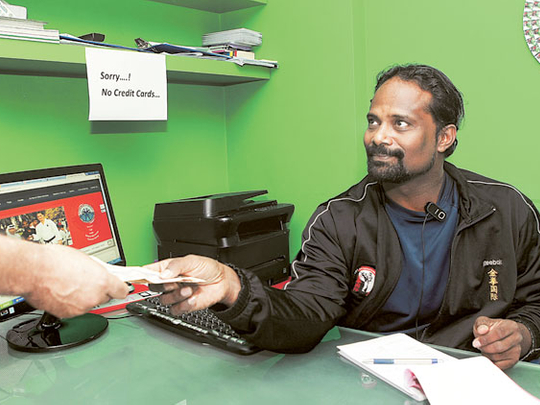
Dubai: K.K. Renjith's studio in Bur Dubai is a favourite place for martial arts and yoga enthusiasts. Customers come and go for a few hours of sweat-filled kicking, punching, sparring or stretching.
But unlike mega-corporation fitness centres that command expensive fees of more than Dh2,000 to Dh3,000 annually, Renjith's small business does not accept credit or debit cards and his patrons always pay by cash.
The Golden Fist in Bur Dubai has about 300 to 350 regular members. It has been operating as a cash-only establishment for 12 years now and Renjith does not have any plans of shifting to electronic transactions. The main reason is that his customers prefer to use paper currency and his business operates on relatively smaller margins.
"It doesn't make sense to set up a point of sale (POS) terminal because my customers are not asking for that kind of facility. They only pay a small amount each time, so they always opt to pay by cash," Renjith explains. "They usually pay only Dh150 or Dh250, so it's not a burden for them to pull that amount of cash out of their pockets," he adds.
Experts recognise that there are still many small and medium enterprises (SMEs) across the country that are reluctant to move to cashless because they believe the business costs involved in installing POS machines don't justify the end benefits.
POS machines or terminals have been an integral part of face-to-face transactions in many small and big businesses. They process payments of consumers who prefer to use credit or debit cards, and they are believed to be an effective way of cutting down on operating costs and increasing profitability.
Merchants who set up a shop in the UAE don't normally pay startup fees or monthly maintenance to offer a card processing service. They, however, pay swipe fees, which the banks levy for each purchase that consumers make with their credit or debit card.
"The merchant only pays a merchant discount fee. This is a small percentage of the transaction amount which is negotiated between the acquiring bank and the merchant," says Marcello Baricordi, country manager for Visa UAE.
The fee can vary depending on the type of merchant and volumes involved, among other factors. "These costs may be sometimes considered as incremental expenses for small businesses during their start up and running operations which prevent a full switch to cashless in exchange for the electronic transaction," Baricordi says.
What most SMEs don't realise is that running a cash-only business is a costly affair. Andy Brown, director for product marketing at ACI Worldwide, notes that counting and re-counting cash at the till, and depositing money in the bank can eat up a lot of productive time.
Managing cash also involves insurance cost and can lead to financial losses, in cases where the staff take money from the till. "There is also a convenience factor in not having to calculate change and, if the retailer is handling a lot of low-value items, using (a payment device with contactless capability) is faster than cash," he says.
"In reality, most SMEs still do not fully take into consideration the actual costs of managing the physical cash (e.g. loss, disruption/shrinkage, frauds, cost of cashing in to the bank, cost of funding for working capital needs) that would be otherwise reduced with electronic payments both in the payable and receivable cycles," Baricordi adds.
But things will soon change, as credit and debit cards are becoming more popular with many consumers. Data collated by Euromonitor International show that the number of payment cards in the UAE has been growing steadily. As of last count, there were about 10.8 million financial cards in circulation last year. That's a far cry from the 4.3 million cards recorded five years ago.
Last month, Renjith opened a new outlet called Renshi's Fitness Centre, just across Internet City, that has a higher price range and a much wider selection of classes. This time, he intends to install a POS terminal to start accepting cards. "It is in the works and by next month, it will be ready," he says.
"Most of the people who go there or inquire about our fitness centre prefer to pay by plastic. It looks like the trend is changing, but it doesn't mean I'm accepting credit card payments at my outlet in Bur Dubai. That will remain a cash-only business," he says.
At Fayyaz Shah's newly opened restaurant in Dubai, a mix of Emiratis, Europeans, Asians and other Arabs pop in for lunch and dinner. At peak times, particularly on Thursday or Friday evenings, the place is packed and Shah has no issue accepting credit or debit card from customers at the end of the meal. Although cash is still accepted, it is rarely exchanged.
The Bar B. Q. Tonight on the junction of Jumeirah Road and Second December Street is one of the growing number of brick-and-mortar businesses that embrace the convenience of electronic transactions.
Shah says the cost involved in setting up credit card machines is very minimal, and in return he attracts a larger number of patrons. He did not spend anything to acquire the payment terminal and, in exchange for the facility, he pays back the bank between 1.5 per cent and 2 per cent per customer transaction.
"I don't mind the cost involved, as long as it generates good business and my customers are happy. I'm able to cater to customers who prefer to pay cash and those who don't," says Shah, a co-owner. "I think this is the trend nowadays. Many people find it more convenient to use cards whenever they're shopping or eating out. It's more convenient and easier to use," he adds.








